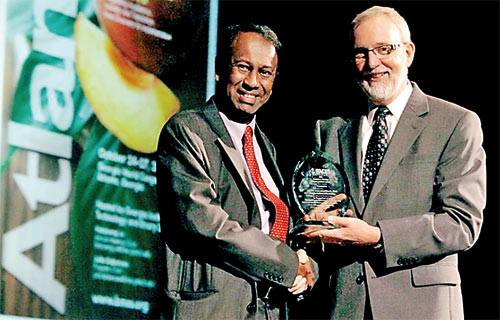New honour for Lankan scientist
This year, Ajit Yoganathan becomes only the second Sri Lankan to ever be elected to the National Academy of Engineers (NAE), one of the highest professional honours accorded an engineer in the United States.
Academy membership honours those who have made outstanding contributions to engineering research, practice, or education, as well as to the “pioneering of new and developing fields of technology,” among other things. In particular, the Sri Lankan born scientist is being singled out for his research into experimental and computational fluid mechanics as it pertains to artificial heart valves, left and right sides of the heart, and congenital heart diseases.

Ajith Yoganathan (left) receiving the Robert A. Pritzker Award
NAE has previously elected only one other Sri Lankan to its ranks. Dr. H. Kumar Wickramasinghe, a professor of EECS and Biomedical Engineering and The Henry Samueli Endowed Chair at the University of California, Irvine, was honoured for his work on nanoscale measurement systems and their application to precision metrology in 1998.
In an email to The Sunday Times, Yoganathan acknowledged what a great honour it was. “I am extremely proud of the translational impact my research has had on the field,” said Yoganathan, who is currently the Regents’ Professor and Wallace H. Coulter Distinguished Chair in the Wallace H. Coulter Department of Biomedical Engineering at Georgia Tech and who also holds a joint appointment in the School of Chemical and Biomolecular Engineering.
For him the honour is not just a personal victory but a win for the people he’s worked with – the graduate students, the post-docs and clinical collaborators – and the impact they’ve had together on human lives.
It is the latest in a string of honours, not least of which was ‘The Emory 1%’ in 2013 which Yoganathan was awarded in recognition of a $2.5 million National Institutes of Health (NIH) grant for research on aortic valve mechanobiology. Currently, he is the recipient of five active grants from NIH – most biomedical research investigators are happy to have one such grant at any one time.
In an impressive career spanning four decades, Yoganathan has cemented his reputation as one of the world’s leading experts in cardiovascular fluid mechanics – very simply how blood flows through the heart. His research is particularly valuable to physicians and surgeons as he finds ways for them to make cardiovascular surgery and treatment more effective and safe. His particular specialisation is in paediatric care.
Yoganathan is also known as the founder of the Cardiovascular Fluid Mechanics Lab at Georgia Tech, which he established in 1979 when he joined the institution after a stint at Cal Tech. The programme has only gone from strength to strength and is now hailed as one of the pioneering laboratories in the world studying the function and mechanics of heart valves and other complex cardiac defects.
Among the highlights of his career have been the development of the surgical planning tool, SURGEM (developed together with Professor Jarek Rossignac in the College of Computing), which has been hailed for revolutionising paediatric surgery in hospitals like the Children’s Healthcare of Atlanta, Children’s Hospital of Philadelphia and the Boston Children’s Hospital.
He also known as the inventor of the Y-graft, a surgical technique that saves wear and tear on the heart.
Born to a GP and a Professor of Pathology in Sri Lanka, Yoganathan was introduced to medicine early, and had intended to study air pollution before he sat in by chance on a lecture on cardiovascular fluid dynamics.It gave him a head start in a field that would soon expand dramatically as it gained in relevance. His work now involves the use of laser Doppler velocimetry, digital particle image velocimetry, cardiac Doppler ultrasound and cardiac magnetic resonance imaging to non-invasively study and quantify blood flow patterns in the cardiovascular system.
Yoganathan who was in Sri Lanka for the first time in 15 years last December, took the opportunity to address the delegates at the Sri Lanka Association for the Advancement of Science’s annual conference, while also giving talks at the behest of the Oxonian Foundation and the Engineering Faculty at the University of Moratuwa.
Back home his team produced 22 peer reviewed papers which were all published in major biomedical journals and made 20 conference presentations for the year. 2014 was also notable for another reason – his start-up company Apica Cardiovascular, which was founded in 2009, was acquired by Thoratec Inc., the largest left ventricular assist device (LVAD) manufacturer in the world.
He says in 2015, their research efforts will aim to “continue to positively impact heart valve patients and children born with a single ventricle.” The team are hoping to expand their paediatric surgical planning techniques with medical centres in the USA and outside. “Currently we are looking to establish a partnership with Toronto Sick Children’s Hospital (the largest Children’s Hospital in Canada) and with centres in India,” he says. If all goes well, Yoganathan hopes to back in Sri Lanka in July this year to address the Sri Lanka Heart Association and see how his research might be put to use in the country of his birth.


